Small Refrigerated Trailer-Cooler Trailers: Your Mobile Cooling Solution
Small Refrigerated Trailer-Cooler Trailers: Your Mobile Cooling Solution
Blog Article
The Ultimate Guide to Choosing the most effective Chilled Trailers
When it involves choosing the perfect chilled trailer for your service needs, various variables need to be thoroughly considered to make certain ideal performance and efficiency. From the various types of chilled trailers offered to the essential attributes such as size, temperature level control, and energy efficiency, each facet plays a critical function in determining the ideal fit for your details requirements. In addition, maintenance and solution suggestions are important to lengthening the lifespan of your chilled trailer. By exploring the details of these considerations, you will certainly be equipped to make an enlightened decision that lines up with your functional objectives and budget plan constraints.
Types of Refrigerated Trailers

When considering the kinds of refrigerated trailers, it is necessary to assess their certain functions and abilities to match the transportation needs of disposable goods. The two primary kinds of chilled trailers are reefer trailers and shielded trailers. Reefer trailers, brief for refrigerated trailers, are geared up with cooling systems that actively regulate the inner temperature level to keep perishable goods at the needed problems during transportation. These trailers are perfect for products like fresh fruit and vegetables, dairy products, meat, and pharmaceuticals that require specific temperature level control - small refrigerated trailer- cooler trailers.

Size Factors To Consider
Considering the dimensions of the refrigerated trailer is crucial to guarantee optimal storage capacity and reliable transport of disposable products. When selecting the size of a chilled trailer, it is essential to take right into account the quantity of products that need to be transferred.
When identifying the dimension of the cooled trailer is the measurements of the goods being transported,One more element to consider. Some products might have particular dimension needs or require to be stacked in a specific way to prevent damages. Consequently, picking a trailer size that accommodates the measurements of the products will aid maintain their quality during transit.

Temperature Level Control Attributes
Reliable management of temperature control in cooled trailers is critical for maintaining the quality and safety and security of perishable products throughout transport. When picking a cooled trailer, it is essential to take into consideration the temperature level control features it provides.
Moreover, some refrigerated trailers include multi-zone temperature level control capacities, enabling various areas to maintain differing temperatures as needed for different kinds of goods. This function is especially useful when transporting a mix of disposable items with distinct temperature demands. small refrigerated trailer- cooler trailers. Furthermore, trailers with efficient insulation and temperature uniformity throughout the Homepage freight area assistance prevent cold or hot areas, guaranteeing constant conditions for all products being transported
Energy Performance Variables
An essential facet to review when picking a chilled trailer is its power performance, which plays a substantial duty in lowering operational expenses and environmental impact. Power effectiveness factors to take into consideration include the insulation quality of the trailer, the kind of refrigeration system used, and any kind of additional attributes that add to minimizing power intake. Premium insulation is crucial as it helps keep the preferred temperature level inside the trailer with minimal power loss. Modern refrigeration systems, such as those using advanced technology like electrical standby options or solar power, can additionally enhance energy efficiency. In addition, features like automatic defrost cycles, temperature level monitoring systems, and reliable airflow layout can even more optimize energy usage. By focusing on energy-efficient chilled trailers, companies can not just reduce business expenses however also minimize their carbon footprint, making a positive payment to sustainability initiatives in the transportation market.
Maintenance and Solution Tips
Offered the vital duty of energy effectiveness in lowering operational expenses, it is essential to develop an aggressive maintenance and solution routine for chilled trailers to ensure optimal performance and durability. Regularly keeping the trailer and evaluating's refrigeration unit is vital. This consists of examining the gaskets for any kind of wear and tear, guaranteeing appropriate insulation, and cleaning up the condenser and evaporator coils. Checking temperature level levels and adjusting the thermostat periodically can assist stop temperature level changes that might jeopardize the high quality of the delivered items. Furthermore, checking the trailer's tires, brakes, lights, and electric systems is necessary to assure trustworthy and risk-free operation. Collaborating with a credible provider for routine maintenance checks and addressing any kind of problems immediately can substantially prolong the lifespan of the chilled trailer. Carrying out a comprehensive maintenance timetable and keeping thorough documents of all service and repairs performed can help in identifying fads, enhancing performance, and decreasing unforeseen breakdowns.

Final Thought
Finally, choosing the finest cooled trailer involves considering different variables such as the kind of trailer, size requirements, temperature control attributes, power efficiency, and maintenance needs. By assessing these elements very carefully, organizations can guarantee they pick a refrigerated trailer that meets their specific needs and requirements, eventually causing more efficient transportation and storage of temperature-sensitive products.
The two main types of refrigerated trailers are reefer trailers and insulated trailers (small refrigerated trailer- cooler trailers). Reefer trailers, short for refrigerated trailers, are geared up with cooling systems that proactively manage the inner temperature level to maintain disposable goods at the required problems throughout transport.On the other hand, insulated trailers are designed to maintain the temperature of the items utilizing the insulation buildings of the trailer wall surfaces. While they do not have active cooling systems like reefer trailers, shielded trailers are appropriate for goods that check that require security from outside temperature level variations yet do not need as strict temperature level control as disposable products.Reliable administration of temperature control in chilled trailers is vital for protecting the quality and safety and security of Learn More perishable items throughout transport
Report this page